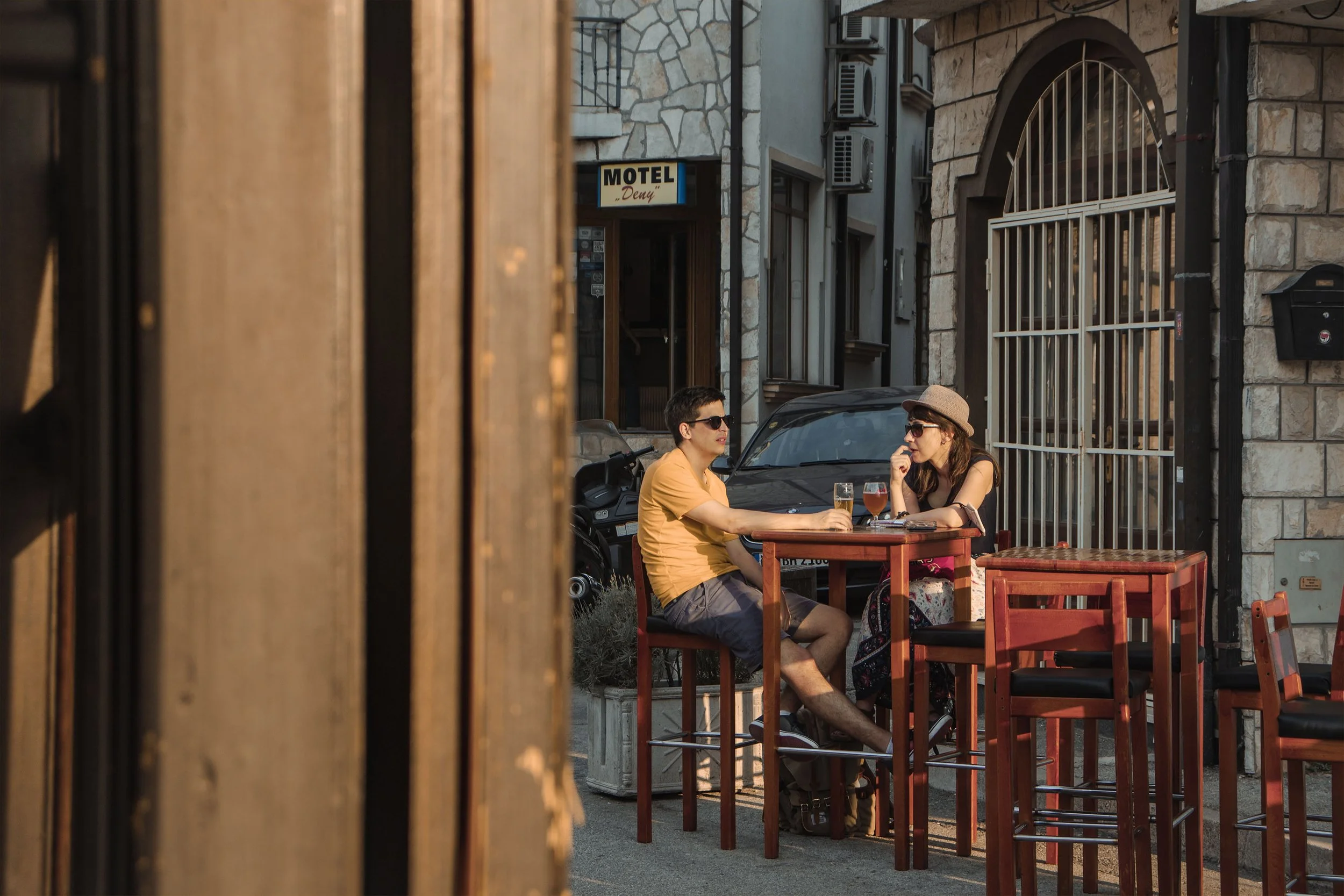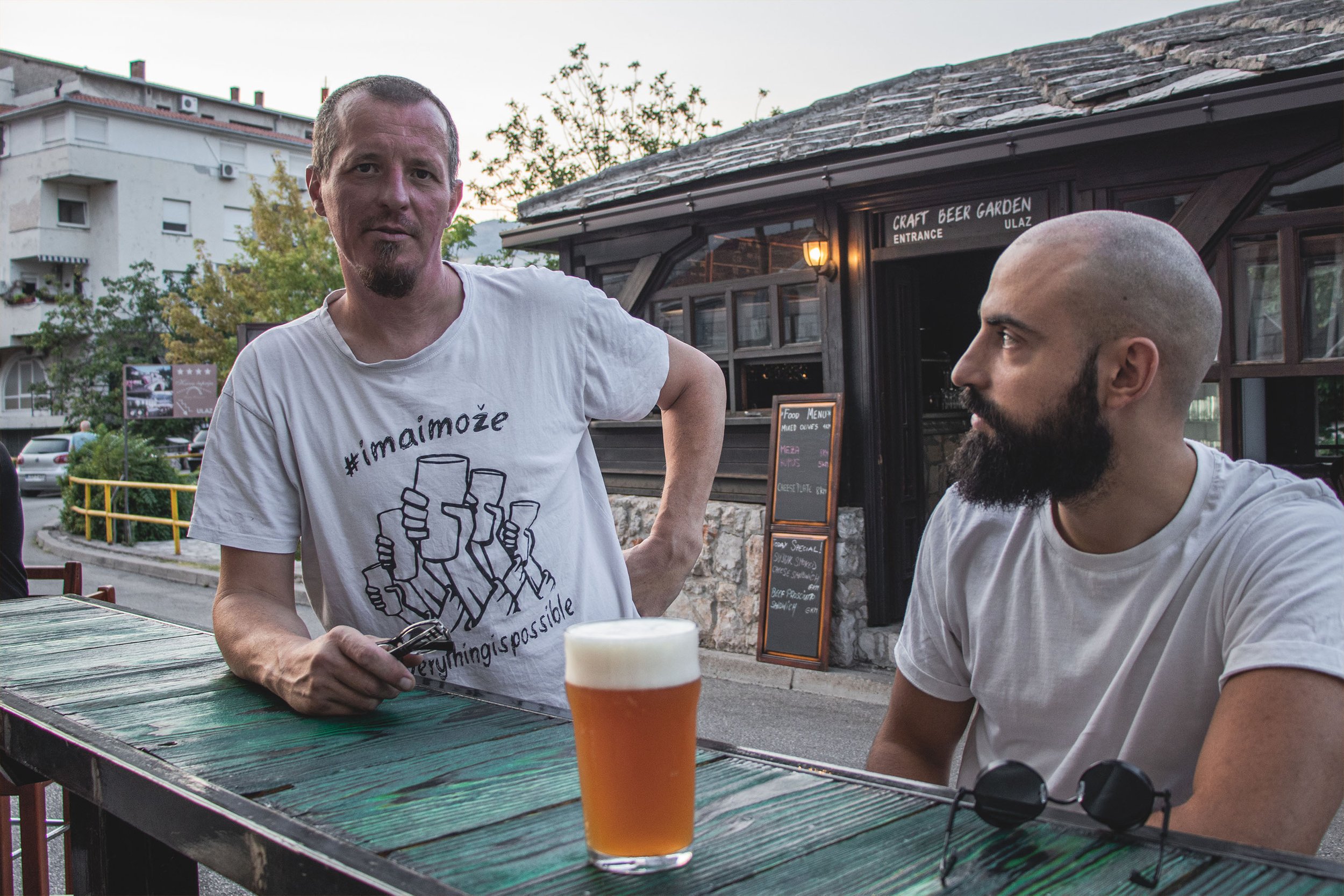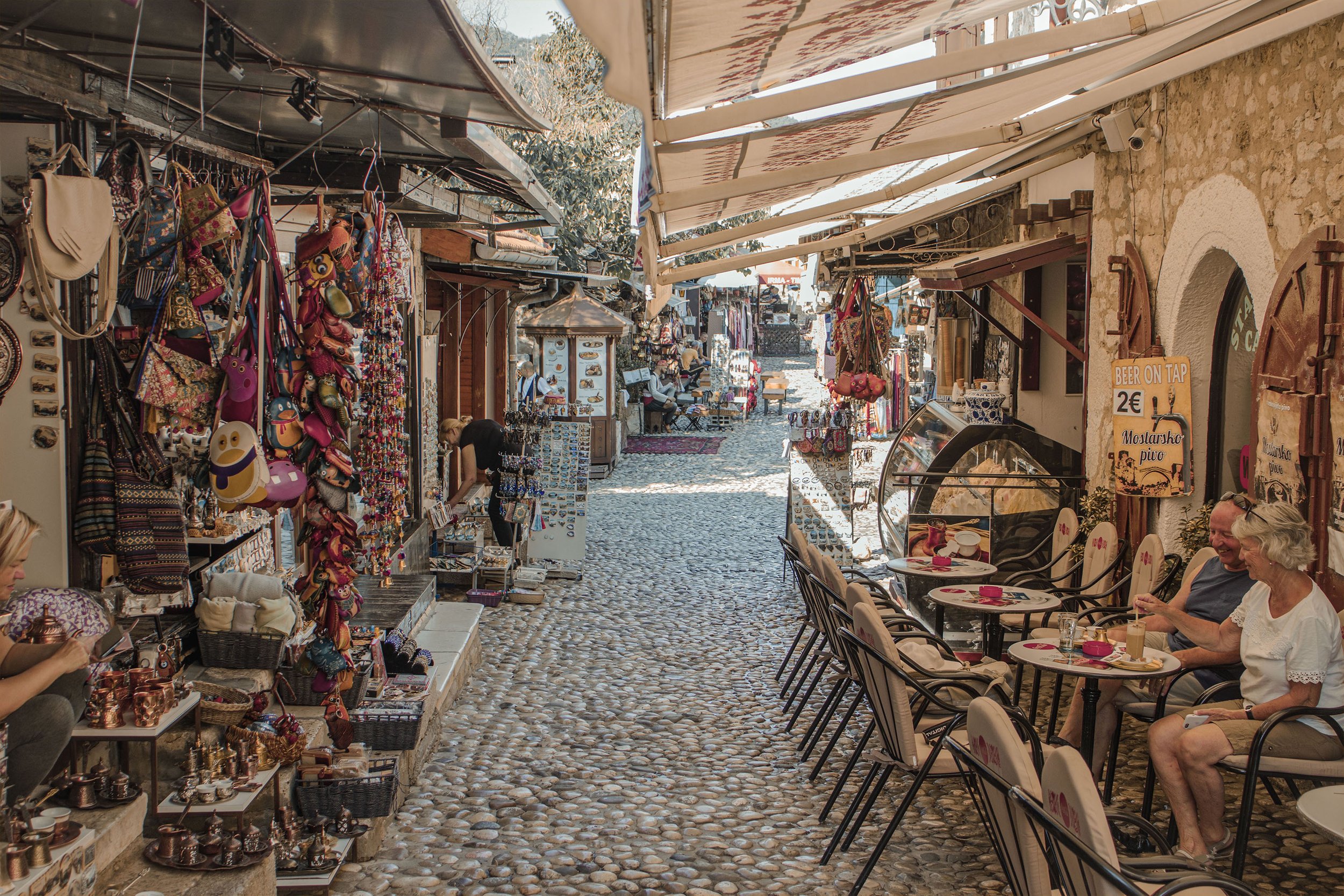It’s a warm Thursday evening in Čaršija, the historic center of Mostar, Bosnia and Herzegovina. With its cobblestone streets, the constant sound of copper workers pounding engravings into jewelry, and shopkeepers drinking coffee on the small steps leading to the entrances on every corner, Čaršija would be idyllic, the kind of location where Hollywood might set love-at-first-sight stories, were it not for cheap souvenirs challenging the sense of authenticity. The Neretva River runs through its center like a compass, dividing east from west, crowned by the famous Stari Most, or Old Bridge, a 16th-century stone construction some 80 feet high but just 13 feet wide, a “must-cross” experience for anyone who visits this small dot in the world.
A young man in a Speedo swimsuit walks toward eager tourists with cameras in hand, announcing the last of the day’s dives with a hat extended outwards in the hope of collecting money—euros or Bosnia and Herzegonina’s own convertible marks—as compensation for a dive. Standing on the bridge and peering down at the emerald waters, you’d hardly believe this country was the setting for one of Europe’s most brutal civil wars just over 25 years ago: From 1992 to 1995, a three-way conflict raged between Bosnian Muslims, Bosnian Croats, and Bosnian Serbs, including right here in Mostar. What you see today looks pristine and peaceful: the minarets of mosques, the bridge’s opposing towers, the neighboring Lučki Bridge several yards ahead, a romantic setting of apparent harmony.
But the truth is, war tourism is mainly what brings visitors to Mostar. And yet the richer history that preceded the war is what extends most tourists’ original travel plans, with Bosnia and Herzegovina part of both the Ottoman Empire and the Austro-Hungarian Empire. That backstory gives Mostar its unusual beauty: mosques and cobblestone streets alongside neoclassical buildings. The streets are lined with trees heavy with ripe figs, early pomegranates, and green mandarins, thanks to the Mediterranean climate. It’s clear why the summer months here are usually packed.
With COVID restrictions lowered and just a handful of masks on Šemovac street, a few time-polished stone steps up from the Old Town, nightlife almost looks like it did before the pandemic. Our small town, home to about 100,000 residents, still welcomes backpackers, returned expatriates, and locals. It’s rare to find them all in one place, but at Craft Beer Garden Ima i Može, both the garden built to suit the surrounding Ottoman-era architecture and the long, community-style wooden tables are crowded with a blend of Mostarians, travelers, and a few single men who look like they’ve finally found the day’s peace with a beer in one hand, a phone in the other.
It’s a huge shift from 2019, when owner and brewer Arslan Mesihović first opened his pub to the general public. Back then, the general public looked a lot more like the same group of five friends playing backgammon under dim lighting, behind an entrance which made would-be customers ask if the place was closed for a private party. It certainly wasn’t thriving, which isn’t uncommon for any business in this difficult, post-war climate. As in many cities in the former Yugoslavia, a lot has been lost in Mostar, and not all has been regained. Because of this, locals aren’t very encouraging towards new projects, which makes Arslan’s venture all the more courageous.
That widespread skepticism gave the place its name: Ima i Može roughly translates as “everything is possible.” Despite the few regulars that tease Arslan every once in a while for it—you have to have thick skin to survive Balkan humor—the title is a testament to his unflinching optimism in the face of Mostar’s dominant narrative: that those who try probably won’t succeed. It’s both a defense mechanism and a harsh realization inspired by the war, and it exists within a culture where introducing anything alternative to food and drink standards is like speaking a foreign language. We Bosnians are creatures of habit, probably still eating the same foods our Illyrian ancestors ate in the 8th century B.C. New ideas usually don’t last for long. Locals joke that if you can make it in Mostar, you can make it anywhere. We’re the New York of Southeastern Europe, only with fewer skyscrapers and far more bullet-marked buildings. Plenty of businesses have tried and failed, quickly. But Arslan’s gift—not believing them when they tell you that you won’t make it—is the reason he’s become the best (and, well, first) local brewer in Mostar.
“Arslan’s just this free man who lives by his own interpretation of the world, and honestly, he’s pretty much right with it. … It makes you feel like anything can be done.”
His arrival—or rather return—quickly made the rounds in this small community. Locals call him Raté, a nickname stemming from rat, the Bosnian word for war. His customers know him for his laid-back attitude. But mention that new-ish craft beer spot to almost any local and you’ll probably hear the same response: “You mean the guy who wears the skirt?” It’s actually a kilt, but in any case, Arslan Mesihović has given the mahalušas—the neighborhood gossips—something to whisper about.
The kilt, yes, and his size 13 Doc Martens. But first, the 2012 appearance of his brewing company OldBridZ, and the subsequent opening of Ima i Može in 2019. I’m not sure if it’s his promptness in bringing you a sample of anything on the menu before you’re even sure if you have the pronunciation right or if it’s more the shoe-size thing, but Arslan’s presence is big. His decision to move back to Mostar after 25 years in the United States as a war refugee feels even bigger. Because while Mostar experiences the emigration of its youth to richer countries in Western Europe at alarming rates, returning to Mostar changes the conversation to what it means to leave, what it means to stay, and how to join the split sides of yourself that are inevitably halved when you are forced to flee your home.
What happens after a war ends usually fails to reach the public’s attention, and Mostar is still facing the economic shocks of existing as a postwar society with high unemployment rates, a struggling economy, and an infrastructure that is heavily reliant on donor countries. Most of the original buildings haven’t been returned to what they once were. Public and private spaces are still locked in political battles. Tourists gape at the damage caused by snipers and grenades while fig trees grow out of holes in the concrete and stretch through broken windows. Where Ima i Može sits, Arslan describes a once-thriving pub he knew in the ’80s and pre-war ’90s, where people were packed shoulder to shoulder almost every night. Back then, during his teenage years, he wasn’t thinking about what might happen, how his life would shift—certainly not that he’d return 20 years later with a suitcase of hops and some knowledge of how to brew.
It’s a case of a true cliché, that life is what happens when you’re busy making plans. Like most citizens who never believed the war would reach Mostar, Arslan’s story was revamped entirely. He was 21 years old when the Bosnian War broke out in 1992. In the U.S., he would’ve been enjoying his first legal drinks. In Mostar, he’d already gone through a year of compulsory military service without ever realizing he might actually be called up for combat.
“In my life, I’ve fired a total of three gunshots for target practice,” he says. “That’s it.”
He’s a pacifist, he stresses to me, which I already knew through my own visits to the bar, where I’d often find him blasting Amy Goodman’s “Democracy Now!” radio show through the pub’s speakers on weekday afternoons. Despite hordes of his schoolmates and friends becoming soldiers overnight, Arslan wasn’t willing to fight, and especially not for a nationalist cause.
He was captured as a civilian and sent to a concentration camp for Bosnian Muslims, an identity used to classify individuals during the war, though it had meant very little to anyone here before the conflict. He managed to escape, then fled with his mother and father to Zagreb, Croatia, while his older brother was trapped on the east side of Mostar, unable to communicate with them for months. In Zagreb, the family weighed their options: Scandinavia, which was notoriously cold and dark, or America, where an aunt in California’s San Fernando Valley could vouch for them. They said yes to the latter, living temporarily in a run-down house whose owners had struggled to find a buyer.
“It was filthy, dirty, a classic picture of an arid California landscape,” Arslan says. “My mother, in an attempt to ease her mind about my brother that we hadn’t heard from, cleaned the home so thoroughly that this unsellable house ended up selling within two months of our occupancy.”
A Pakistani family who owned a local KFC took them in, and Arslan was given a job at a local T-shirt factory, with accommodations provided to them by an Islamic community support group for Muslim refugees. He tells the story nonchalantly, but I can’t help but ask if delving into his experience is bringing up any war trauma for him.
“No, no—I’ve processed all of that shit already,” he says with a laugh. “At the T-shirt company we were given Fridays off as a Muslim custom, but in exchange, we had to work nine hours a day every other day of the week. My feet hurt so fucking bad.” Several years and jobs later, Arslan moved to Northern California, where he began working in electronics, an industry he stayed in until his eventual move back to Bosnia and Herzegovina.
“Personally, I’ve never ordered the same beer two times in a row in one night. But here, I’m always working to push people to step out of their comfort zone, getting them to try something new.”
Luckily, beer culture was growing in his adopted home. Arslan soaked it up through visits to breweries like Drake’s Brewing Co., Faction Brewing, Russian River Brewing, and Heretic Brewing & Distilling. Intrigued, he attempted to make his own cider: He liked beer, he had a juicer, and well, why not? It shouldn’t be too tough. But it was, and he stopped when the juicer started to smoke.
After that near-disaster, Arslan’s neighbor across the way in Oakland suggested he should join him in brewing a batch of beer. Now a national judge for the Beer Judge Certification Program, Jason Davis handed Arslan a list of what they’d need for their first brew-in-a-bag session. Davis ended up forgetting his mash bag. Arslan quickly came up with a pillowcase, which provided them with a name: Pillowcase Beer. After that, their roles were set. Davis focused on visiting competitions while Arslan was the quick-fix, brainy do-er. That trait is still in him, as seen all around his pub: Masking tape holds up Christmas lights, and logo stickers are slapped onto menus. The Ima i Može attitude seems ingrained in Arslan. He finds a way.
Not every brewer has an “aha moment” that pushes them out of their kitchen and into their own pub like Arslan did, even if that happened 10,000 kilometers away from Mostar. It came when Davis and Arslan brewed their own version of El Camino (Un)Real, a collaboration between Stone Brewing, Firestone Walker Brewing Company, and 21st Amendment Brewery: a strong Black Ale with chia seeds, pink peppercorn, fennel seed, dried figs soaked in bourbon, and American oak wood chips with, as Arslan puts it, a shit-ton of hops. He retells the story vividly, like he’s back there in his California kitchen and not sitting with me in his Mostar pub, pouring the first taste after three weeks of fermenting, sipping, and engaging in simultaneous screaming at what they had created, like two little boys finally adding that last Lego to their masterpiece. It was April 20, 2012.
“After that, I thought to myself, if I can make something this fucking good, it’s my duty to share it with other people,” Arslan says.
As his customers can confirm, that’s definitely Arslan—straightforward, not afraid to tell you that what you’re about to drink is going to put your taste buds on permanent strike against boring beer. He’s known for his ability to radiate so much confidence that you’re willing to try whatever it is he brewed. Even a prosciutto beer.
“Arslan’s just this free man who lives by his own interpretation of the world, and honestly, he’s pretty much right with it,” Davis says. “Be it the kilt or the five-finger shoes he wears, Arslan figures out a good thing and sticks to it. He makes no apologies for anything. It makes you feel like anything can be done.”
As Arslan’s laughter fades out from his retelling of his “aha moment”, a small truck parks in the middle of the street. A middle-aged man in a T-shirt and cargo shorts gets out and walks up to us with two large plastic grocery bags bursting with grain. Arslan greets him like an old friend, glances at the grain, and directs him to a staff member for payment. “Everything I use here is local,” he says. He stresses how important it is to highlight that. When I ask him if the line of organic bottled juices he carries includes pineapple, he looks me dead in the eyes. “Do pineapples grow in Bosnia?”
But when he arrived, local beer wasn’t part of Mostar’s culture. As elsewhere, the region’s biggest breweries worked with restaurants and cafes, offering branded umbrellas and cushions in exchange for exclusivity. At the time, Arslan was spending his summers here, sweating off the warm temperatures while drinking the same big-brand Lagers, because what else was there? The options were always the same familiar labels, the Budweisers of the Balkans: Sarajevsko, Ožujsko, Heineken.
But that emptiness was where the magic happened, with just a few little problems to solve before he could start making beer in Mostar. That crucial element that holds most of us back, the ability to just get started, Arslan overcame. During the summer of 2012, he began by searching for fermenters, and enlisting the help of some local wine-equipment manufacturers to recreate something like what he and Davis were brewing on back in Oakland: a Blichmann sculpture.
“After that, I thought to myself, if I can make something this fucking good, it’s my duty to share it with other people.”
Initially, the idea was to start a brewing company, no pub necessary. With high unemployment and no one brewing beer locally, Arslan naively imagined he could just come to Mostar for the summer, enlist the help of a few locals, get the beer brewing, and then reap the benefits whenever he arrived—hoppy, hand-made, outside-of-the-ordinary beer. It was a modest dream with a few missing details, like the close-to-zero success rate for new projects here. That, and the fact that others rarely share the same enthusiasm as the project’s creator. He trained a few friends he thought might enjoy some new knowledge and a job, but whenever he left, the process would come to a standstill—no beer, no benefits. Years passed like that, spending summers trying to push for some movement with what he was calling OldBridZ Brewing. Eventually, his father and brother—who ended up staying in the country throughout the war—jumped on board, and OldBridZ became the family business it still is.
There was some progress. A local bar called Brodari carried his beer on tap, and the bottles started to make their way around. Meanwhile, Arslan was still back in California for most of the year, working in tech departments and waiting for summers back in Mostar. After a few months, he realized that in order to get the business really moving, he had to be there. OldBridZ needed a push. The best solution? Open a pub.
And that’s how Ima i Može was born. Arslan found the location just outside of Old Town, located close to the actual Old Bridge of the name. When the ezan, the mosque’s call to prayer, goes off in the middle of our interview, I point out that he’s located right between a mosque and a Roman Catholic church. “Yeah, and you can see the Serbian Orthodox church on the hill above,” he replies. In our ethnically divided city which is still defined as having east and west sides, Arslan says that beer is a connector. And it’s important that we have at least a few shared spaces here, because in Mostar almost everything is still segregated by religion: schools, colleges, post offices, even puppet theaters for kids. But a beer garden with local beer on tap? Just one.
That attitude hasn’t hurt his business. Nor have Arslan’s antifascist T-shirts caused any confrontations. “Everyone was telling me that I was bound to fail, especially because one of the first things I said was that the bar wouldn’t allow smoking indoors.” That’s maybe commonplace in other parts of the world, but in Mostar it’s like opening a pub without any bathrooms. “Even friends said they wouldn’t come, and some didn’t, because of that specific policy. But I didn’t and I won’t change that. It’s part of the moral values of the pub.”
Morally speaking, Ima i Može certainly has its values. Local sourcing is fundamental—the juices, the local brandies, the fresh cheeses he selects from the market on the weekends. The pub is also listed as LGBTQI friendly on its Yelp page and offers beers with names like She Can Do That, even making donations to events like a local production of “The Vagina Monologues” and sports clubs. It sounds like small beans in the West, but if you consider the political and cultural climate in this part of the Balkans, something as simple as banning indoor smoking can close your business for good. That, plus Arslan’s kilt, might be considered micro-revolutions. Here, change comes slowly.
With the opening of the pub, bringing good beer to Mostar’s residents got at least a little bit easier. His first year was mostly like a club for friends, a local named Dama tells me.
“In the early days, it was mainly just our meeting place,” Dama says. “We’d come and pick on Arslan about all of his grand plans, like building a rocket stove seating area or expanding the space, while we were single-handedly keeping his business alive. We’d watch people pass by the windows and walk directly to the now-closed neighboring pub just a few meters away. We’d drink, play backgammon, and try to ignore the blaring music and the sound of the crowds from over there.”
Their loyalty paid off. Eventually they brought with them more friends, more recommendations, more requests for the infamous OldBridZ IPA Marakuja, and more players waiting for a turn on the pub’s new, custom-made shuffleboard table. Slowly, the business grew.
Although Arslan rotates his beers constantly and tries not to do too much of the same thing, it’s not too easy to spread variety in this part of Europe. People tend to find one beer they like and stick to it, a habit Arslan is trying to break.
“Personally, I’ve never ordered the same beer two times in a row in one night,” he says. “But here, I’m always working to push people to step out of their comfort zone, getting them to try something new.”
He plays it safe by pouring Lagers for those who don’t like hops and handing out samples to customers who tend to order the same winners over and over again. Undoubtedly, his biggest crowd pleaser is the aforementioned IPA Marakuja, which means passionfruit in Bosnian: a crisp IPA with slightly less bitterness and a bit more fruit flavor than most. It’s aromatic and citrusy, with hints of grape and passionfruit. He brews it with Centennial and Mosaic hops he orders from the U.S.—the one thing he imports—though he’s currently working on a deal with local farmers to grow hops for him.
There’s also high demand for a beer called Djavolica—the Devil—a 6.66% ABV Red Ale. Arslan calls it “very devilish,” and laughs again in his deep, villainish way. And I laugh, too, though at the same time I’m listening to the imam’s call just a few meters from Arslan’s doorstep. His attitude is refreshing, a real release from the tension that Mostar still holds when it comes to any talk of religion, like something from Mostar before the war. I’m pregnant so I’m only drinking water, but I start sulking when I see a new addition on tap: Dubrovnik Beer Company’s Mood Booster Maskeron, a kveik-fermented mango IPA. It sounds like the closest thing I can drink to a lavender sour beer Arslan brewed several years ago, only not with lavender, and from a different country, Croatia. Part of what is possible at Ima i Može is beer from elsewhere: from all over the Balkans, and even further afield.
“That’s the goal,” he says. “The more local specialty beer, the better.”
As we speak, he’s planning an Oktoberfest celebration, which will include craft beer from several of the countries neighboring Bosnia and Herzegovina. He’s happy to share his customers with other brewers, and that’s where his success lies, away from the mindset of limited opportunity. It shows in his staff, where he focuses on trying to hire younger people in need of experience. The energy isn’t catered towards beer elitists or beer intellectuals. It’s more down-to-earth, acknowledging that everyone deserves good beer.
As we wind down the interview, Arslan takes a phone call from a local vendor selling homemade rakija, our local fruit brandy. “Yeah, honestly it’s not good,” he laments. It’s a resistance to people-pleasing, mixed with a delivery that feels smooth and reassuring, a good kind of honesty. That attitude can make or break you in our culture, but Arslan carries it in just the right way, offering trust when asked, but sugarcoating nothing. It’s the Balkan character that stayed with him, a perfect counterbalance to his Californian optimism.
Looking around at the success of his venture, I can’t help but ask what it was he saw for his future, or where he saw this going. Was Oakland a “left and never going back” story? Was Mostar the place he wanted to call home home? But like so many other members of the Bosnian diaspora living lives with one foot here and one foot there, wherever “there” may be, he says he’d like to adopt a 50-50 approach, with room for new places: part-time California, part-time Mostar. That’s who Arslan Mesihović is now, a hybrid of the two worlds he grew up in, with good beer to greet him wherever he arrives.































